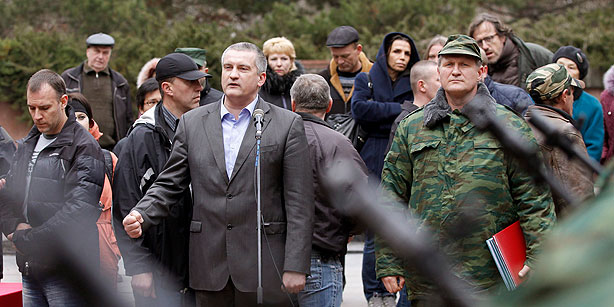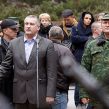
Crimean Plebiscite: Result Pre-Determined, Implementation Still Uncertain
Publication: Eurasia Daily Monitor Volume: 11 Issue: 49
By:

The Crimean government and parliament are completing preparations for the plebiscite scheduled to be held on March 16, leading to the Autonomous Republic of Crimea’s secession from Ukraine and possible annexation by Russia.
Heading the Crimean government and parliament in this effort are two Greater-Russia nationalist politicians, both originally from Moldova. The illegally installed prime minister of Crimea, Sergei Aksyonov, was born in 1972 in Moldova’s city of Balti (Beltsy), the son and grandson of Soviet army officers. Aksyonov’s father headed a short-lived “Russian Community of Northern Moldova” which soon moved to secessionist Transnistria. The Crimean parliament’s chairman, Vladimir Konstantinov, was born in 1956 in Transnistria and grew up there in Soviet times. Both politicians embarked on shadowy business careers in Crimea during the 1990s, before stepping into the political limelight. Aksyonov joined the irredentist “Russian Community in Crimea” in 2008 and formed the Russian Unity party there in 2010, appealing to fringe voters who favored secession from Ukraine and accession to Russia. For his part, Konstantinov outed himself as late as February 20, 2014, while visiting with Russia’s top parliamentary leaders in Moscow. There, Konstantinov solemnly called for Crimea’s secession from Ukraine and accession to Russia (ITAR-TASS, February 20).
Moscow has executed the capture of Crimea quickly and flawlessly. The operational measures are fully completed by now. The “legal” icing on the cake remains to be added.
During the second half of February, Russian President Vladimir Putin’s overseer of Abkhazia and South Ossetia, Vladislav Surkov, as well as senior Russian parliamentarians visited Crimea. Almost certainly they assessed Aksyonov and Konstantinov as the appropriate local civilian leaders of a putsch to be carried out by the Russian military in Crimea.
On February 26–27 in Simferopol, Russian troops seized the Crimean parliament and government buildings. A session of the Crimean parliament was held on February 27 in the presence of Russian troops, without any public attendance, and after communications with the rest of Ukraine had been cut off. Held without a verifiable quorum, the session decided by an unverifiable margin of votes to dismiss the Crimean government, appoint Aksyonov to form a new government, and schedule a referendum for May 25 on the issue of enlarging Crimea’s autonomy vis-à-vis the central government in Kyiv. The coup’s civilian leaders as well as Moscow were still paying some lip service to Ukraine’s territorial integrity at that point, even if the proposed enlarged autonomy would have negated that integrity in practice.
Outright secession from Ukraine was openly proclaimed in Sevastopol before being proclaimed in the rest of Crimea. On February 23, a Russian irredentist rally in Sevastopol had proclaimed the local businessman Aleksey Chaliy as “mayor” of that city and head of a newly created executive body of power. Chalyi, a citizen of Russia, openly announced Sevastopol’s secession from Russia before the Crimean rump parliament had done so. Sevastopol forms a political-administrative entity separate from the Autonomous Republic of Crimea. Under the Ukrainian constitution, Sevastopol is a special-status city subordinated directly to the central government in Kyiv (see EDM, February 28, March 4, 7).
On March 1, Aksyonov appealed to Putin “to provide assistance in ensuring peace and tranquility on Crimea’s territory.” That appeal paralleled deposed Ukrainian president Viktor Yanukovych’s March 1 appeal to Putin for Russian military assistance to restore order in Ukraine. On that day, Russian forces fanned out and occupied the entire Crimean peninsula, blockading and disarming Ukrainian military, police, border guard, naval and coastal guard units. On that same day, the Aksyonov-Konstantinov tandem in Simferopol and Chaliy in Sevastopol decreed that Ukraine’s military, police, border guard, naval and coastal guard shall henceforth be subordinated to the Crimean Autonomous Republic authorities and to the Sevastopol city authorities, on their respective territories (Interfax, March 1, 2).
On March 6, the Crimean parliament rushed the time-table, re-scheduling the plebiscite for March 16; and it re-formulated the questions on the ballot, adding an explicit option for Crimea to join the Russian Federation (see below). Moreover, the Crimean parliament appealed to Russia’s executive leadership and parliament to accept Crimea within the Russian Federation. That move in effect pre-judged the plebiscite’s outcome. On March 7, a Crimean parliamentary delegation under Konstantinov received a triumphal reception in the Russian parliament in Moscow (Interfax, March 6, 7, 8).
On March 11, the Crimean parliament adopted a “declaration of independence.” In the event the plebiscite endorses accession to Russia, the declaration says, Crimea would become an “independent and sovereign state” which would then initiate procedures for its accession to the Russian Federation. Russia’s Foreign Affairs Ministry instantly issued a statement assessing the Crimean plebiscite (as re-formulated) as corresponding with international norms, and characterizing the “independence declaration” as legally valid. Also, in effect, pre-judging the outcome, Russia’s mission to the Organization for Security and Cooperation in Europe (OSCE) invited OSCE observers to the March 16 plebiscite—such an invitation implying that Russia already held sovereignty over Crimea (Interfax, March 11, 12).
The two options in the March 16 plebiscite are:
1. Are you in favor of Crimea’s reunification with Russia as a constituent part of the Russian Federation?
2. Are you in favor of restoring Crimea’s 1992 constitution, with Crimea’s status as a part of Ukraine?
Although the plebiscite will in no sense be free—or perhaps because of that—it is generally expected in Crimea, in Ukraine and internationally that the first option will prevail. However, Russia will not immediately activate the accession procedure. Moscow will find it advantageous to bargain with Ukraine and with the West, holding out the possibility of halting the annexation and “freezing” the conflict for some time to come. This is why Moscow must have inspired the Crimean parliament’s “declaration of independence” (see above) almost at the last moment. A Transnistria-type solution for Crimea would clearly be preferable to Russia.




